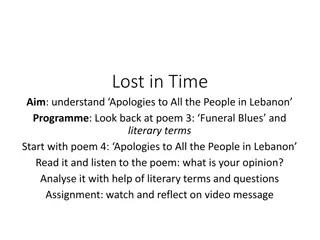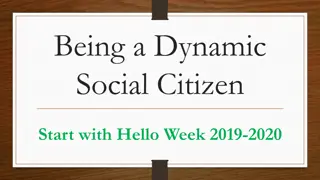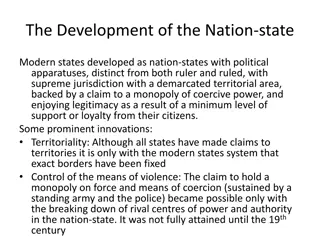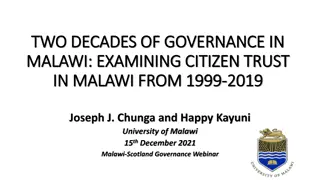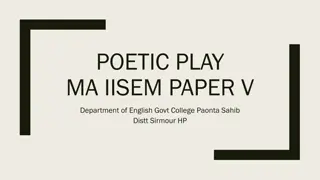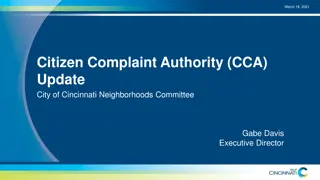Analysis of "The Unknown Citizen" by W. H. Auden
The poem "The Unknown Citizen" by W. H. Auden is a satirical commentary on modern society's dehumanization and loss of individual identity. Through the persona of an unnamed citizen reduced to a mere number, the poem critiques bureaucratic control, conformity, and the erasure of personal agency. The Unknown Citizen is commemorated as an ordinary figure who embodies the faceless, conformist ideal of a government-controlled society. Auden's work serves as a warning against the devaluation of human individuality in the face of government intrusion and societal pressures.
Download Presentation

Please find below an Image/Link to download the presentation.
The content on the website is provided AS IS for your information and personal use only. It may not be sold, licensed, or shared on other websites without obtaining consent from the author. Download presentation by click this link. If you encounter any issues during the download, it is possible that the publisher has removed the file from their server.
E N D
Presentation Transcript
The Unknown Citizen W.H.Auden (To JS\07M378 This Marble Monument Is Erected by the State ) This is an epigraph with which the poem opens . We are reading a dramatic poem . It is all an act . The poem is pretending to be an official celebration of a dead person : the Unknown Citizen . The words are inscribed on marble monument that was paid for by the State , or Government.
The Epigraph We do not know which government . But referring to State makes it sound very ominous. It seemed that JS\07M378 is how the Unknown Citizen is identified , and the monument is dedicated To him . By referring to people in this way is obviously very cold and impersonal , but it can also be convenient , so bureaucrats do it all the time . By the way , the monument is clearly a parody of the Tomb(s) of the Unknown Soldier , found in many different nations and dedicated to soldiers who died anonymously in battle. The Unknown Citizen is not a particular person he represents the average of all people in society . In the phrase The Unknown Citizen , the word unknown means ordinary and obscure . So , the whole phrase means the ordinary ,obscure soldiers as citizens of the state who laid down their lives for defending their motherland , who wanted name and fame but remained unknown . Thus , the title means the ordinary average citizen in modern industrialized urban society . He has no identity and individuality . He has no desire for self assertion . He likes to remain unknown.
Analysis The Unknown Citizen has no name , he has only a number to whom the monument has been built and has been found to be without any fault . He was a saint not because he searched for God but because he served the government perfectly . He did not get dismissed from his job . He was a member of the Union and paid all his dues to the Union. A report by the Union shows that it was a balance Union and did not take extreme views on anything . The poem may also be labeled as an elegy which is a poem about a dead person . It is also satirical . It shows what the poet thought might be the future of the individual if the government continued to pry into personal business. The poem was written in 1940 after Auden moved from England to the colonies (the United States ). Before World War ii , Auden decided to write a parody of the Unknown soldier comparing it with the non-existent unknown citizen . The speaker is government worker who addresses readers and listeners in first person plural point of view (using our &we )to indicate that he is speaking on the behalf of his fellow government employees.
Analysis The setting is a cemetery with a marble monument over the Tomb of the Unknown Citizen . No such tomb exists , but many countries have tombs memorializing soldiers killed in combat whose identity can not be established often because of disfiguring wounds . The poem represents a comparison or an analogy between the monument of the Unknown Citizen and that of the unknown soldier. Although it is not stated directly , it is clear that the poem presents an ironical comparison . Still , the most striking comparison is that of the Unknown Citizen with a saint . There is nothing holy about the way in which he acts except that he was serving the community. It is as though the Bureau of Statistics has a guy who looks into the backgrounds of all people . He had all the right parts. No one really knows him or even what he looks like . But that does not matter since his information fits in all the little slots. The poet was worried that people were losing their identity as men were becoming numbers . The citizen has become faceless in modern society .
Analysis The social psychology workers found that he was popular among his fellow workers and had a drink with them now and then . He also bought a newspaper everyday . He reached to the advertisements normally . He had a good health although he went to the hospital once , he came out quite cured. He was sensible about buying things on an installment basis. He had everything a modern man needed at home . Moreover, this ideal citizen was found to be sensible in his views . When there was peace , he supported it but when there was war he was ready to fight . He did not hold his personal views on anything . He had the right number of children and he did not quarrel with the education they got. Every thing about him could be understood in some kind of statistical formula put out by the government or its agencies. He had surrendered his individuality and was often identified by number rather than personality features which were of course common to all citizens . The poet now asks the important questions whether he was free or happy . No government statistics can ever answer these kinds of questions . By asking these questions , the poet is drawing our attention to the question of freedom and happiness. Ironically , he suggests that the modern man is a slave to routine and he is incapable of understanding such concepts . Therefore, such questions are absurd in this context .The poem then is a bitter attack on modern society and its indifference towards individuality and identity.
Analysis The irony lies in that the so called ideal citizen is valueless and colorless entity , nothing more than a mechanical part of a highly mechanical society. He is made representative of the mass society and had no distinctive qualities by which he could identify himself .





